Best Practices for Building a Skincare Routine for Sensitive Skin

Sensitive skin demands extra care and attention. By learning to create an effective skincare routine, you can alleviate discomfort and promote healthier skin. In this blog, we will discuss the best practices for building a skincare routine specifically designed for sensitive skin.
Characteristics of Sensitive Skin
Sensitive skin often shows a heightened reaction to environmental factors and cosmetic products, leading to symptoms like redness, itching, and discomfort. This skin type is generally more prone to inflammation due to a compromised barrier function, influenced by genetics, harsh climates, and stress. Understanding these traits is crucial for creating a personalised skincare routine that soothes and protects while maintaining the skin's natural balance.
That being said, here are some signs your skin might be sensitive:
- Easily irritated by skincare products
- Prone to redness or inflammation
- Dry and flaky patches
- Reaction to certain environmental triggers such as sun exposure or extreme temperatures
- Persistent itching or tingling sensations
- Burning feeling upon application of even mild products
- Rough texture accompanied by uneven skin tone
- Visible broken capillaries or veins
- Swelling or puffiness after contact with potential irritants
Everyday Skincare Routine for Sensitive Skin
Creating a tailored skincare routine for sensitive skin is an artful balance of selecting gentle yet effective products and techniques. This subsection will guide you through an everyday skincare regimen that caters to the unique needs of sensitive skin, ensuring it remains calm, nourished, and protected throughout the day. By following a structured routine that priorities mild and non-irritating formulations, you can nurture your skin's delicate nature and indulge in a holistic care approach that brings forth its natural radiance.
Morning and Daytime Routine
- Use a gentle fragrance-free cleanser - A gentle cleanser will help maintain your skin's pH balance while providing a refreshing start to your skincare routine. Begin your day by washing your face with a mild, fragrance-free cleanser. This type of cleanser is designed to effectively remove dirt, oil, and impurities without stripping your skin of its natural moisture or causing irritation. Opt for a cleanser that is free from harsh chemicals, sulfates, and artificial fragrances, as these can be detrimental to sensitive skin.
- Apply moisturiser: Choose a hydrating, fragrance-free moisturiser to keep your skin nourished and hydrated. Look for ingredients like ceramides, hyaluronic acid, and glycerin which help to strengthen the skin's natural barrier and maintain moisture levels. Apply your moisturiser immediately after washing your face while your skin is still damp to lock in hydration.

- Protect your skin with sunscreen: Always apply a broad-spectrum sunscreen during the day to shield your skin from harmful UV rays. Look for SPF 30 or higher, and make sure the formula is gentle and non-irritating. Ingredients to steer clear from are oxybenzone, octinoxate, and avobenzone.

Evening Routine
- Opt for a mild, hydrating cleanser: Cleanse your face again in the evening to remove makeup and impurities. Choose a cleanser specifically formulated for sensitive skin, and avoid harsh scrubbing or hot water.

- Apply moisturiser: Reapply your moisturiser to keep your skin hydrated overnight. You can also opt for a thicker, creamier formula at night to provide extra nourishment while you sleep.



- Serums: Incorporate serums with soothing ingredients like niacinamide or hyaluronic acid to help calm and hydrate the skin.

Ingredients to Avoid for Sensitive Skin
To ensure healthy skin, it’s crucial to avoid specific ingredients that may worsen skin sensitivity. Here are some skin ingredients you may want to steer clear of:
- Fragrances: These can irritate the skin and trigger allergic reactions.
- Alcohol: Often found in toners, alcohol can dry out sensitive skin.
- Sulfates: These harsh detergents can strip the skin of its natural oils.
- Essential oils: While they may have therapeutic effects, they can also be irritating to sensitive skin.
- Exfoliating acids in high concentration: High concentrations can cause redness and irritation.
Helpful Tips for Sensitive Skin
- Always patch test a new skincare product: Before fully incorporating a new skincare item into your routine, apply a small amount to a discreet area of your skin, such as the inside of your wrist or behind your ear. This simple step helps you check for any adverse reactions, ensuring that the product is safe for your skin type.
- Avoid over-exfoliating: Exfoliation is essential for removing dead skin cells and promoting a healthy glow, but too much can lead to irritation and sensitivity. Limit your exfoliation to once a week, and opt for gentle products that won’t strip your skin of its natural oils.
- Watch for irritants: Stay vigilant about the ingredients in your skincare products. Some substances can trigger flare-ups or allergic reactions, especially if you have sensitive skin. Take the time to read labels and adjust your routine if you notice any negative effects.
- Be cautious with DIY treatments: While homemade skincare products can seem appealing and natural, they can sometimes do more harm than good. Ingredients that are safe for consumption aren’t always suitable for topical application, so approach DIY treatments with caution and do thorough research before trying them.
- Use a humidifier: During dry seasons, the air can strip moisture from your skin, leading to dryness and irritation. Using a humidifier in your home can help maintain humidity levels, making a significant difference in keeping your skin hydrated and healthy. Consider placing one in your bedroom while you sleep for optimal benefits.
When to Seek Professional Help
If you’re experiencing persistent skin irritation or discomfort, consulting a dermatologist or skin specialist could be beneficial. A professional can offer personalised advice to address the underlying causes of your skin concerns. This approach allows you to pinpoint specific issues, receive sensitive-skin appropriate treatments, and create a customised skincare regimen tailored to your unique skin type and needs.
Get Holistic Skincare with Expert Help at Skin to Heart
Whether you're looking to care for your sensitive skin or seeking advice on a specific skincare concern, Skin to Heart is here to help. Our team of experts provide personalised guidance and treatment plans tailored to your unique skin needs. With our holistic approach to skincare, you can achieve healthy, radiant skin from the inside out. Book a consultation with one of our experts today and embark on your journey to skin health!
Skincare Routine for Sensitive Skin FAQs
- Should I use retinol every day?: Retinol can be irritating for sensitive skin; start slowly and consult a professional.
- Is niacinamide good for sensitive skin?: Yes, niacinamide is known for its soothing properties and can help reduce irritation.
- Can sensitive skin use vitamin C?: Some vitamin C products can be too harsh; opt for gentle formulations.
- Is retinol good for sensitive skin?: It can be beneficial but should be introduced gradually and used with caution.
- Tags: sensitive skin skincare
0 comments


